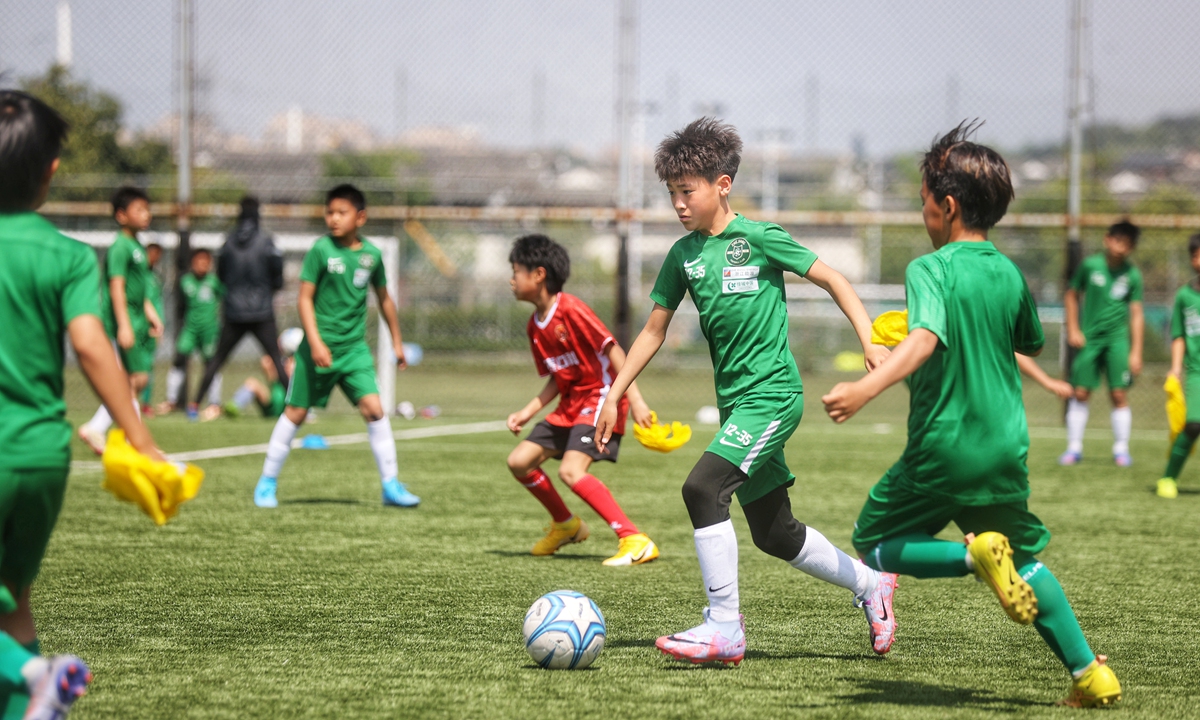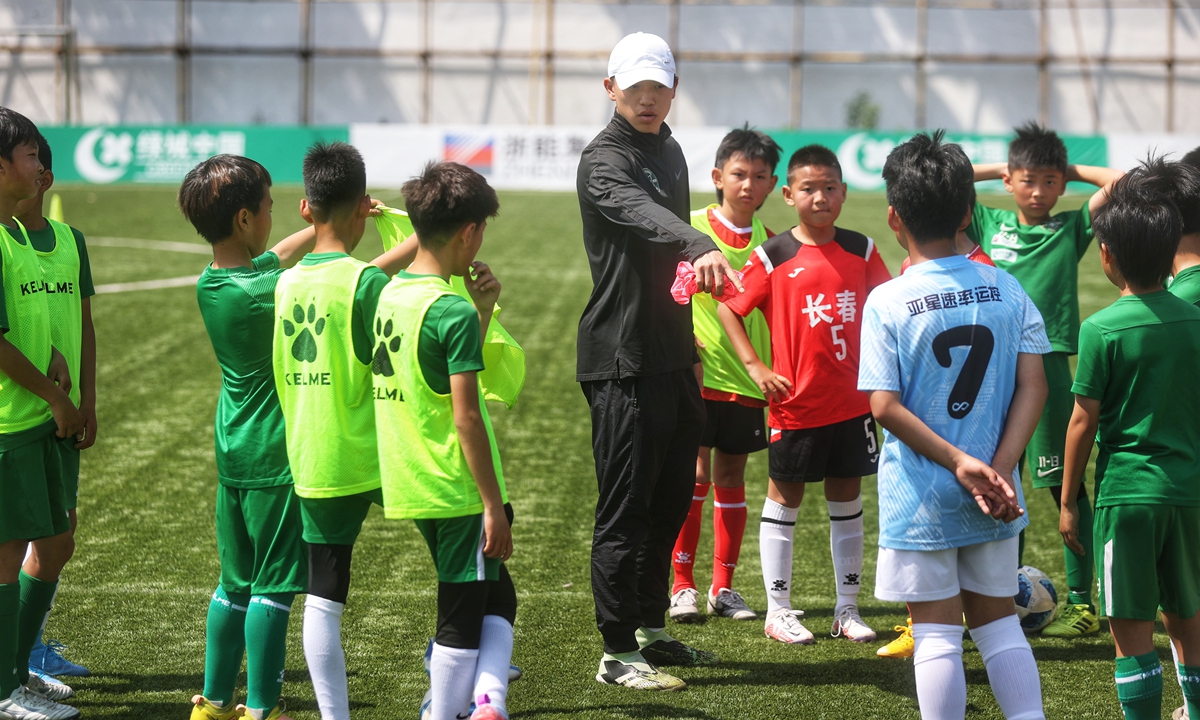
Kids play during a training session at the Zhejiang FC youth academy in Hangzhou, Zhejiang Province. Photo: Cui Meng/Global Times
Boasting 10 accolades at domestic youth soccer competitions, Zhejiang FC continues its campaign to develop their flagship soccer academy after contributing more than 800 players to Chinese soccer.
Located in the outskirts of Hangzhou, the capital of East China's Zhejiang Province, the state-of-the-art training facility that combines 10 soccer pitches has produced over 160 players who have been summoned to represent China at international competitions.
Through consistent investment in youth development, Zhejiang FC has built a pipeline that has consistently produced talented players, many of whom are now playing professionally in China's top tier.
One of the most significant recent successes is Zhang Yuning, a striker who joined the academy in 2008 and went on to represent the Chinese senior national team in 2016.
Though he is not playing for Zhejiang's first team, the story of Zhang, who recently won the 2022 Chinese Footballer of the Year, has underlined the fact that the club's youth academy program is on the right track.
Domestic honorsThe academy has certainly produced its fair share of success stories in recent years.
In 2021, the Zhejiang team won their first-ever gold medal in the 11-a-side soccer competition at the National Games, thanks to the contributions of academy graduates.
The academy provides a comprehensive training program for players between the ages of 9 and 21, aimed at developing their technical skills, tactical awareness, physical fitness and mental toughness.
But for the coaches and staff at the academy, success isn't just measured in trophies and medals.
It's about developing well-rounded individuals who will go on to make a positive impact on society, whether or not they become professional soccer players, Zhejiang youth academy director Tomoyoshi Ikeya told the Global Times.
"Our goal is to produce not just good players, but good people," the Japanese told the Global Times.
"We want to teach our players the value of teamwork, discipline, and hard work, and instill in them a love of the game that will stay with them for the rest of their lives."
The academy's success is due in large part to the club's commitment to youth development. Zhejiang FC has always highly valued its academy, seeing it not just as a way to produce future first-team players, but as a means of promoting soccer in the region and fostering a sense of community.
"We believe that youth development is the key to the future of Chinese soccer," said Jiao Fengbo, the Zhejiang FC's general manager.
"That's why we've invested so much in our academy. We want to give young players the best possible chance to succeed."

A coach instructs young players at the Zhejiang FC youth academy in Hangzhou, Zhejiang Province. Photo: Cui Meng/Global Times
The academy also places a strong emphasis on education.
All players are required to attend school. Some of the coaches are also trained educators, and they work closely with players to ensure they are progressing academically as well as athletically.
But of course, soccer is still the main focus at the academy.
The training regimen is rigorous and demanding, designed to develop every aspect of a player's game. Sessions are run by experienced coaches, including several from Japan, who bring with them a wealth of knowledge and expertise.
The academy has strong links with Japanese soccer great Takeshi Okada, who in 2010 became the first Japanese coach to lead Japan to qualify for the last 16 in a FIFA World Cup. Okada was the head coach of Zhejiang's first team in 2012 and 2013, but it was during this period that Okada left a lasting impact on the development of the academy and in shaping the academy's philosophy and approach to training.
After the pandemic
The COVID-19 pandemic dealt a blow to the development of young players at the academy, as travel restrictions hampered the young players' chances to take part in matches both domestically and internationally.
Ikeya said he hopes youngsters can play around 30 to 40 high-level competitive matches a year, as they can improve the players' ability to handle complicated situations on the field.
"We want to produce players who can play with intelligence and creativity, who can adapt to different game situations, and who can contribute to the team in a variety of ways," said Ikeya.
The young players of the academy used to travel to Japan every summer to train and compete with local teams. During this period, the players are required to live with Japanese families to learn more about the soccer community. As travel restrictions have lifted, the program could resume later in 2023.
Once the young players were mainly from Zhejiang Province, but now the club has expanded its scouting across the country as it has diversified talent scouting by cooperating with other soccer agencies both in Zhejiang and other provinces.
Despite the youth academy's many successes, Ikeya acknowledges that there is always room for improvement, as the club is constantly looking for ways to refine its approach and stay ahead of the curve in terms of coaching and player development.
"We are always learning and looking for new ways to improve," said Ikeya. "We want to continue to produce top-level players and contribute to the growth of Chinese soccer as a whole."
Years of efforts in youth training have been continually bearing fruit for Zhejiang.
Seven players in Zhejiang senior team's 35-man squad participating in the 2023 season of the Chinese Super League are home-grown under-21 players from the academy.
A giant billboard on a training pitch at the academy facility reads: "With pure intentions, we'll walk the farthest road."
Zhejiang's investment in youth soccer will continue to thrive.





